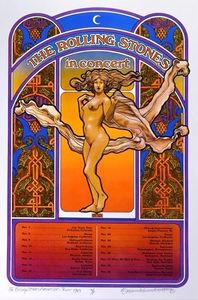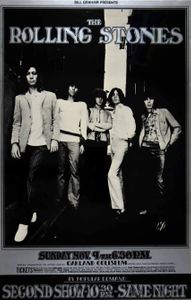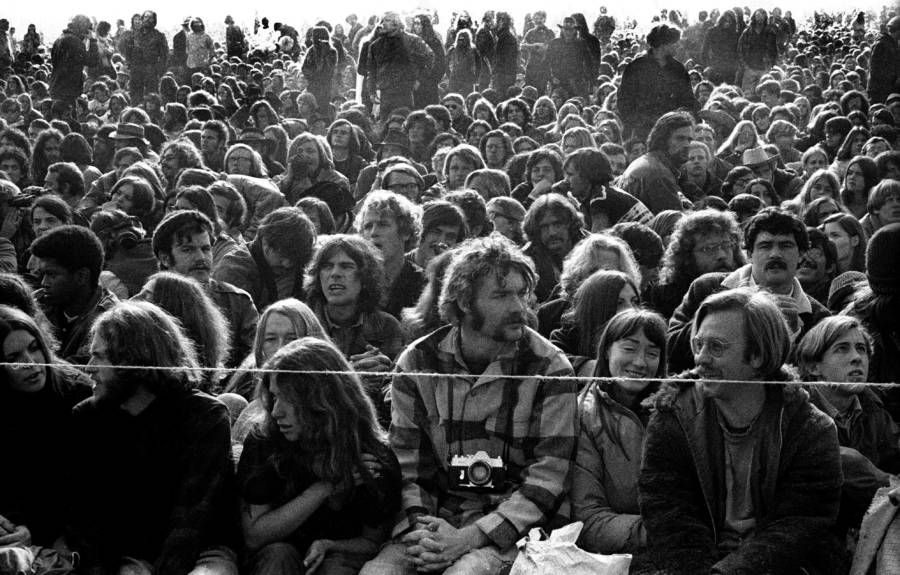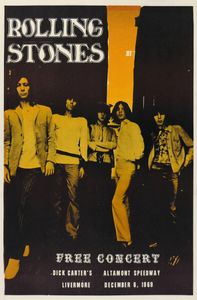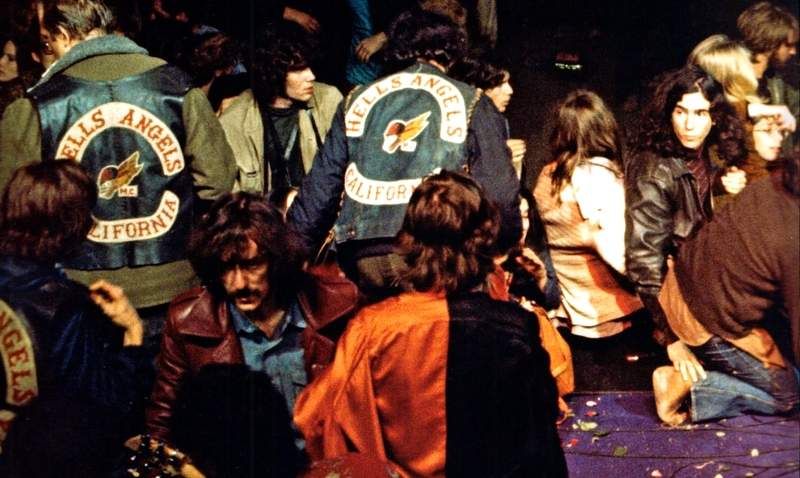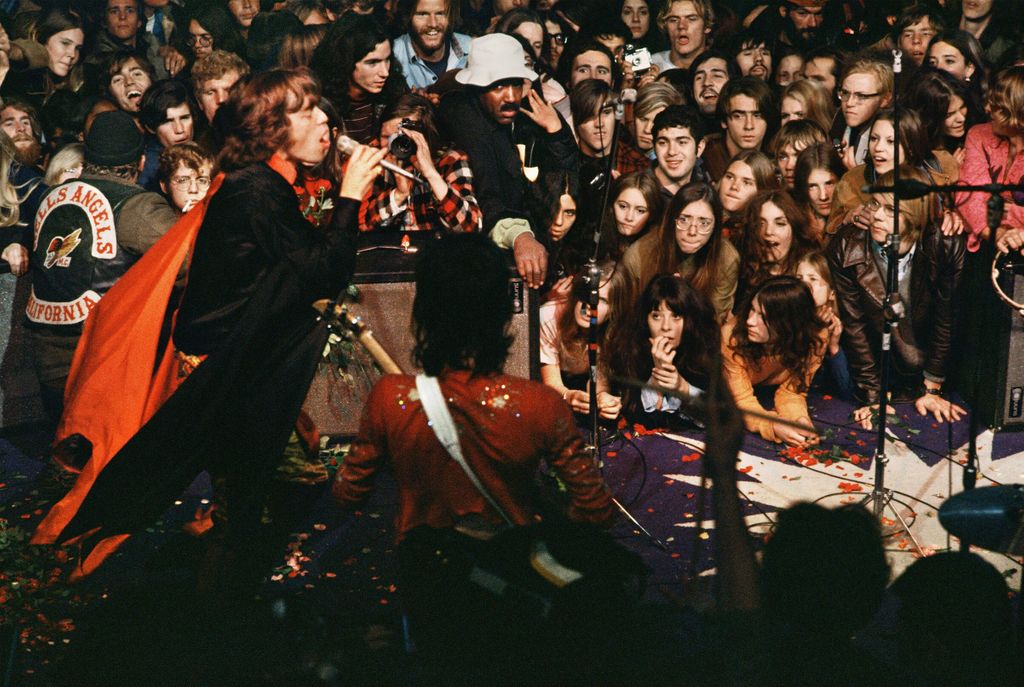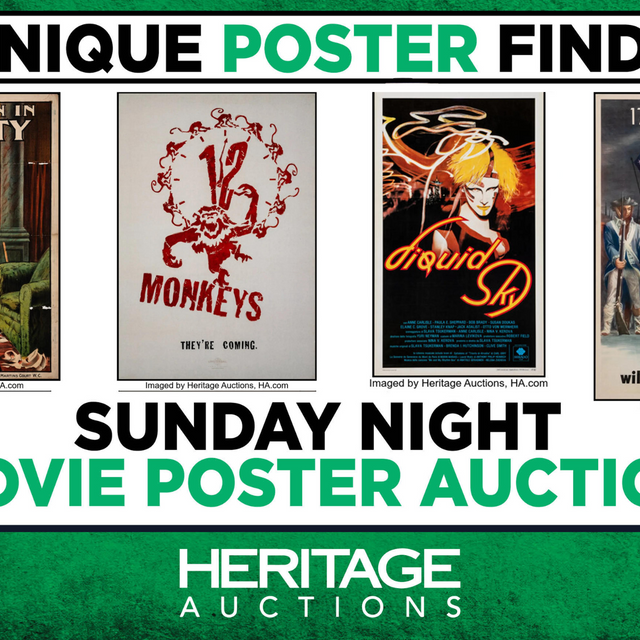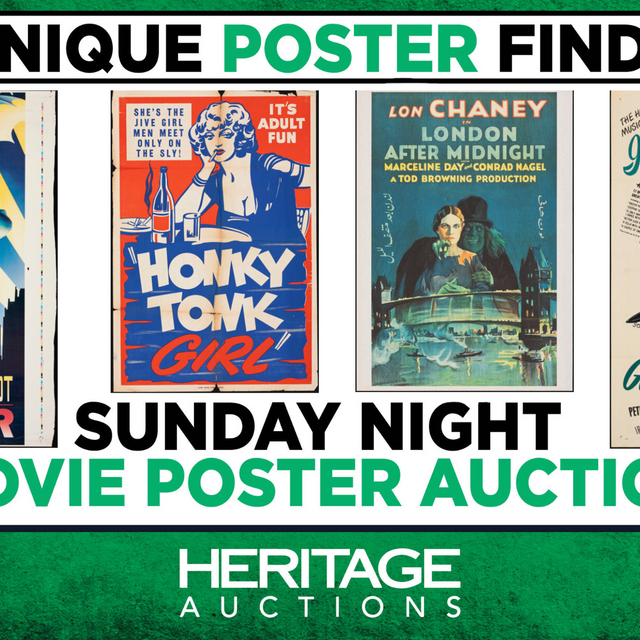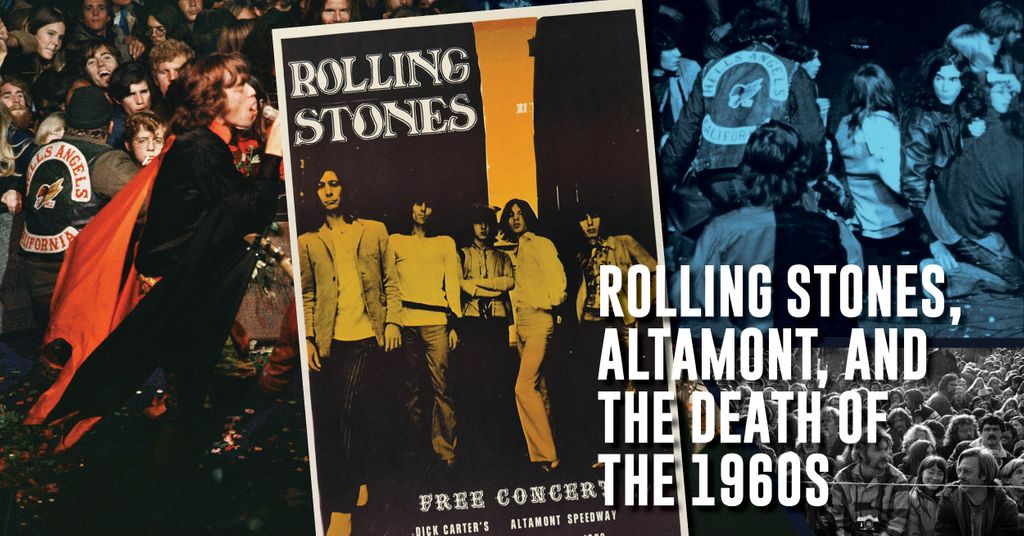
Altamont Speedway Free Festival took place on December 6, 1969. Woodstock had taken place in August of that year and this event was thrown together to rival it. Some were even calling it "Woodstock West." But let's zoom out for a minute and take a look at the bigger picture, specifically Rolling Stones' US tour.
Rolling Stones U.S. Tour
Rolling Stones were on their first U.S. tour since 1966, the absence due to drug charges and other personal issues. Original guitarist Brian Jones was replaced before the tour; Mick Taylor was making his debut with the band. Rock critic Robert Christgau called it "history's first mythic rock and roll tour." To say the tour was highly anticipated would be putting it lightly.
This tour poster sold for $960 via Psychedelic Art Exchange in January 2021.
The band was joined on the tour by Terry Reid, B.B. King, Ike & Tina Turner, and on some dates, Chuck Berry. The tour ran from November 7 to December 6, 1969, sometimes with the band playing two shows per night due to such high demand.
Bill Graham & Ed Sullivan
On Sunday, November 9th, The Stones played a show for Bill Graham at Oakland Coliseum. Once again, two shows on the same night, the band played a 10:30pm set. These concerts would often go well past midnight. This specific event captured was Live'r Than You'll Ever Be, which is considered one of the first-ever bootleg concert recordings.
The poster for the event was designed by artist Randy Tuten, and is known by its catalog number BG-201-OP-1. A 9.0 CGC graded copy sold for $960 in 2019 via Psychedelic Art Exchange.
Rolling Stones also played a two-night stint at Madison Square Garden on November 27 and 28. It is noted that Tina Turner would often upstage the headliner throughout the tour with her and Ike's powerful live show. Janis Joplin joined Ike & Tina for a rendition of "Land of a Thousand Dances" previously popularized by Wilson Pickett. The footage from the shows would be featured in the 1970 documentary Gimme Shelter.
The tour also took the band to the Ed Sullivan Show on November 23rd. The band was filmed at CBS Studios in Los Angeles but edited in a way to appear that they were in New York.
Altamont Speedway Free Festival
The tour was originally supposed to end on November 28th in New York, but the promoter added a show in West Palm Beach, Florida on November 30th. Altamont (December 6) was hastily assembled as a response to the high ticket prices for the tour, which were around $3 to $8 (adjusted for inflation would be approximately $24 to $63 today).
The story of Altamont gets complicated because there are rivaling narratives about how and why it was set up. Jorma Kakaunen of Jefferson Airplane claimed that Rolling Stones were the biggest band in the world (outside of the Beatles) and they wanted to show The Stones how great of a scene San Francisco had.
Originally, the concert was supposed to take place in Golden Gate Park.
Jefferson Airplane were on tour at the time, and by December 4th, only a couple days before the event was set to take place, the plans had broken down. Paul Kantner of Jefferson Airplane blamed city officials and the Police for not wanting to work with the bands due to previous issues with hippies in the Haight-Ashbury district.
From there, organizers tried to get Sears Point Raceway, but they wanted $1,000,000 in retainer from Rolling Stones. That would prove an impossible task for the organizers to get together on such quick notice. At the very last moment, Altamont Speedway owner Dick Carter offered a venue for the event and all parties scrambled to put the event together.
Grace Slick (singer of Jefferson Airplane), stated, "The vibes were bad. Something was very peculiar, not particularly bad, just real peculiar. It was that kind of hazy, abrasive, and unsure day. I had expected the loving vibes of Woodstock but that wasn't coming at me. This was a whole different thing." (from the Grace Slick Biography by Barbara Rowes).
Grateful Dead provided a slightly different narrative.
They state that the event was originally supposed to take place at the San Jose State University Practice Field, but the University didn't want to be on the hook for that big a concert. The story then starts blending into Jefferson Airplane's account. After securing Altamont as the venue, the bands and organizers went to work building a stage and figuring out logistics. No one had the time to secure portable toilets and scaffolding for the stage build. Instead, they just built a 39-inch-high stage and decided to get Hells Angels to act as security.
Even the poster for the event was hastily put together. Randy Tuten simply reused his previous Oakland Coliseum art and slightly repurposed it for this concert. While unassuming in terms of design, this is considered a "holy grail" among collectors.
Featured here is the orange variant poster, it last sold for $40,800 via Psychedelic Art Exchange in 2019. Its dimensions are approximately 12" x 18". Other variants include yellow and two shades of green. The poster was printed the day before the event so the organizers had no time to hang any around the city.
As previously mentioned, the show was free, in response to the high ticket prices of the Rolling Stones tour. So this was a "thank you" to the fans for supporting their return to the states. Also on the bill were Santana, Crosby Stills Nash & Young, Grateful Dead, Flying Burrito Brothers, and Jefferson Airplane.
The Hells Angels
The free concert ended up attracting 300,000 fans who made their way to the hastily thrown together event. It is often reported that the Hells Angels motorcycle club was there to act as security. They claim, however, that their main job was to make sure no one tampered with the generators. (In exchange for $500 worth of beer.) It's worth noting that Jefferson Airplane and Grateful Dead had existing relationships with the motorcycle gang, including their involvement in Ken Kesey's Acid Tests (AOR-2.4-OP-1). Hippies of the time often viewed them as "outlaw brothers of the counterculture." (from Flowers in the Dustbin, by James Miller).
On the day of the event, many showgoers note that the Hells Angels were taunting people as they came through the gates, revving their engines and eventually flinging dirt and mud at them. Many patrons didn't know how to react. They simply kept to themselves, hoping to not raise the ire of the gang.
Rolling Stage played their last song and patrons began to make their way in the darkness back to their cars.
Grateful Dead ended up not playing due to the violence at the event, which included multiple stabbings and a reported rape. Most patrons weren't even aware of the casualties until the next day when local news affiliates began reporting on it. One man drowned in a drainage canal. Two campers were crushed to death by a runaway car. Lastly, a young African American man, Meredith Hunter, was stabbed at the front of the stage during Rolling Stones' set.
Rolling Stone Magazine covered the story and video footage even captured the stabbing of Meredith at the hands of a few Hells Angels. In 1970, the film Gimme Shelter covers the last few weeks of the U.S. tour leading up to and including Altamont.
Hells Angels leader Sonny Barger was quoted as saying, "They told me if I could sit on the edge of the stage so nobody could climb over me, I could drink beer until the show was over."
Interestingly enough, young filmmaker George Lucas was also in attendance at the show; he claims to have filmed some of the event for the documentary. He also stated that his camera jammed and none of the footage made the final cut.
In Summation
While Woodstock is viewed historically as a triumph of the 1960s, conversely, Altamont is a testament to the darkness of the time. The nation was deep into the Civil Rights movement and at the height of the Vietnam War. The 1970s would lead to more unrest, with the Kent State shootings and on into the Watergate hearings.
Peace and love were over, all with the Altamont Free Concert serving as a bookend to an idea, an end of an era.
Check out more about music!
-
PACIFIC NORTHWEST MUSIC & MURDER SCENE
-
WHEN DATES COLLIDE – STRUGGLES OF ARCHIVING CONCERT POSTERS
-
MOOKIE BLAYLOCK: THE CURIOUS CASE OF A SHOW THAT NEVER HAPPENED

